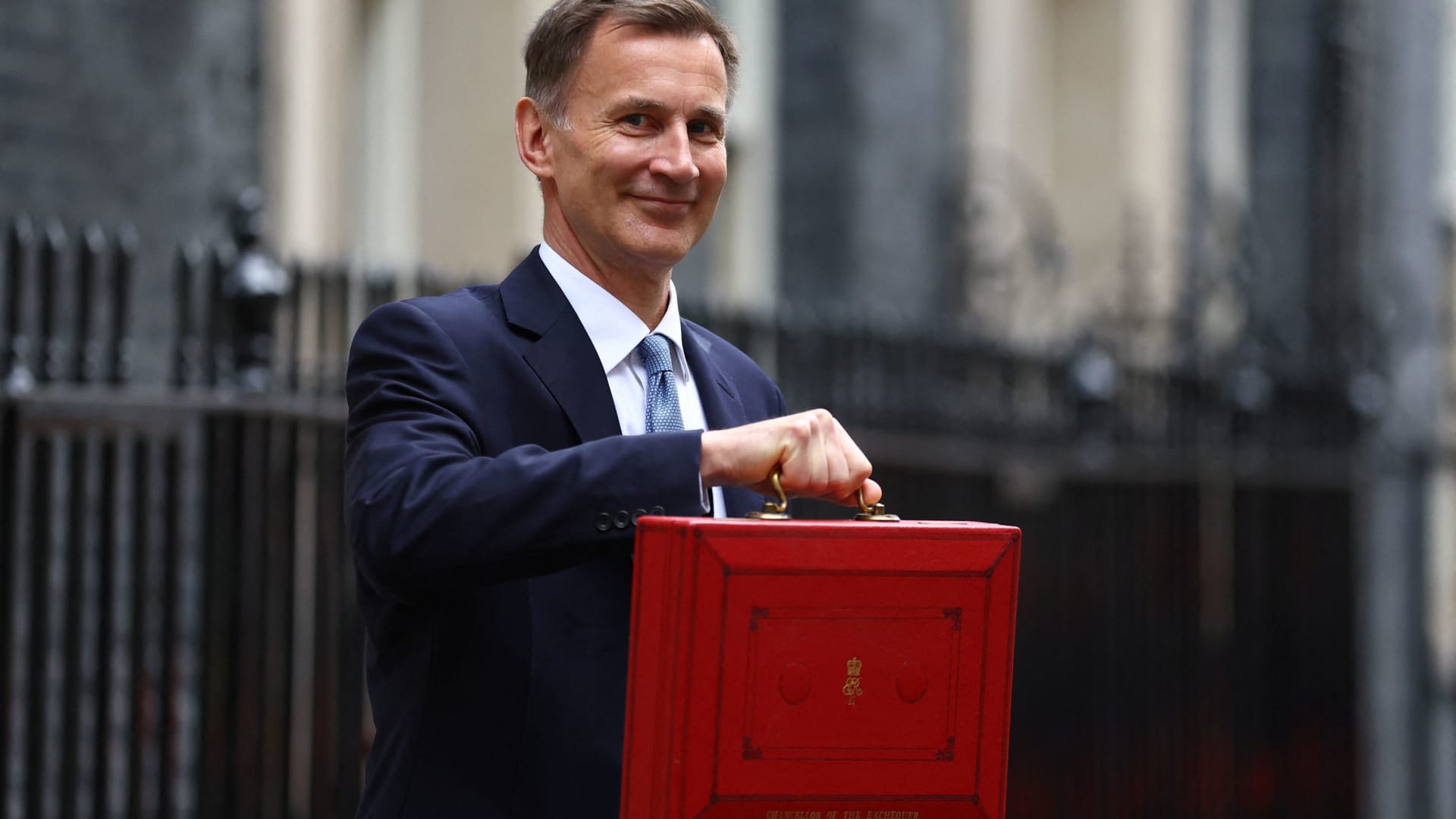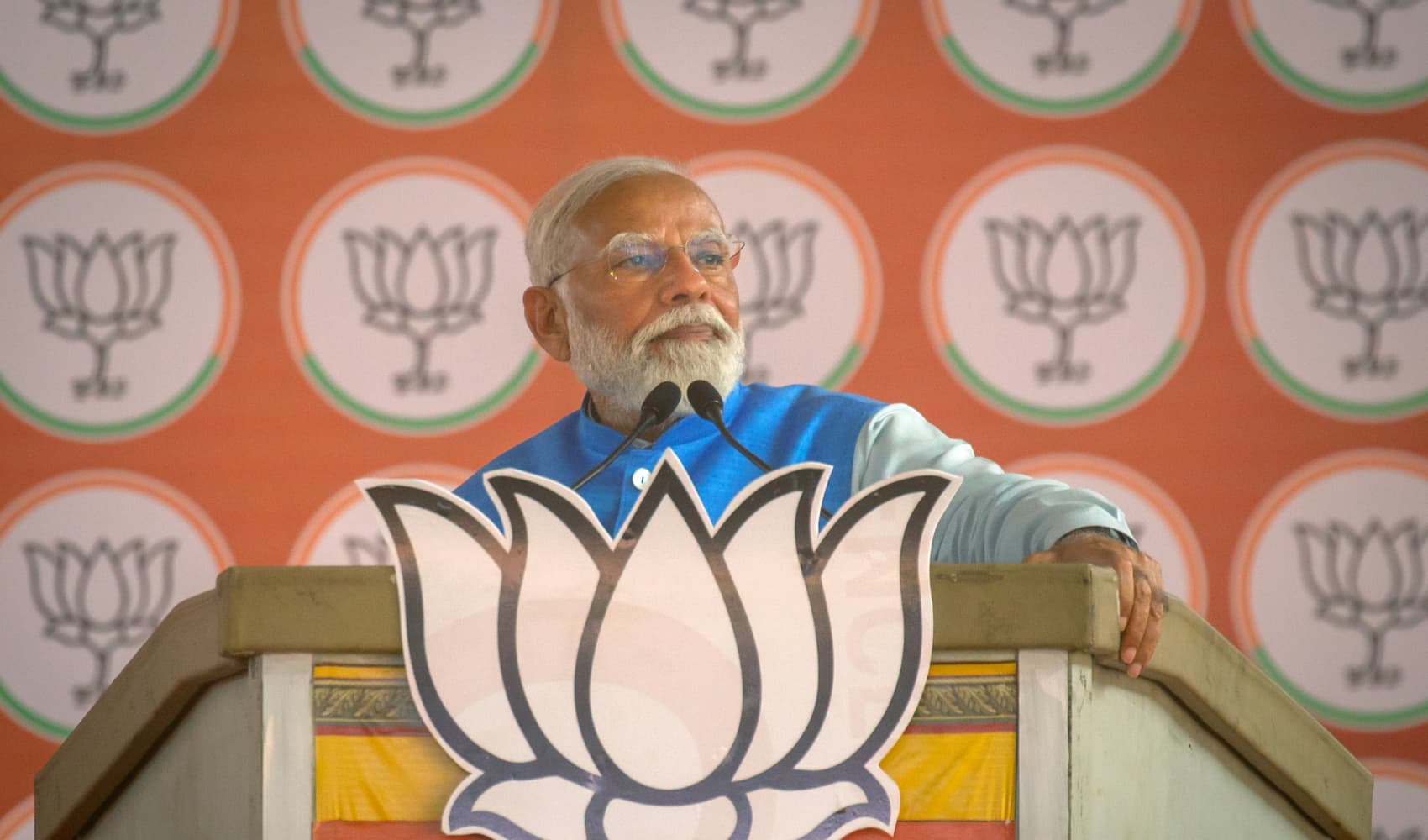
This is CNBC's live blog covering European markets.
European stock markets were higher on Friday afternoon as euro zone consumer price rises cooled, and a key U.S. inflation print came in lower than expected.
The benchmark Stoxx 600 index was up 0.7% at 3:30 p.m. London time, with sectors largely in the green. Retail stocks extended Thursday's rally, up 1.6%, while household goods rose 1.4%.
Banks slipped 0.4% despite positive momentum through the week, with Swedbank as one of the worst-performing European stocks.
Get Connecticut local news, weather forecasts and entertainment stories to your inbox. Sign up for NBC Connecticut newsletters.
Euro zone headline inflation slowed to 6.9% in March, a preliminary reading showed, down from 8.5% in February — the sharpest fall on record, according to Reuters. But core inflation, stripping out energy and food, increased from 5.6% to 5.7%.
European Central Bank policymakers have this week suggested more interest rate hikes are necessary, but may come at a slower pace. The ECB hiked by 50 basis points in March.
Further data releases through the morning showed a drop in German retail sales; while the U.K. economy recorded 0.1% growth in the fourth quarter of 2022, revised up from a first estimate showing no growth.
Money Report
The U.S. personal consumption expenditures price index, excluding food and energy, increased 0.3% in February, new data showed Friday. The inflation gauge, which came in slightly lower than expected, is closely watched be the Federal Reserve and investors as they chart the path of future interest rate hikes.
"Markets are rounding off the first quarter of 2023 in a positive fashion," said Sophie Lund-Yates, lead equity analyst at Hargreaves Lansdown.
Global tech stocks are up 19% for the quarter, she said, and investors are feeling more confident despite jitters in the U.S. banking space.
"The nearer-term catalyst for further market moves will be the U.S. inflation read later on today. While inflation has been moving in the right direction overall, core inflation remains sticky. There are likely to be positive ripples across the major indices if we see core inflation loosening, because it clears further rubble out the road for risk-on assets to prosper," she said in emailed comments.
Asia-Pacific markets closed higher on Friday. U.S. stock futures were slightly lower.
U.S. stocks move higher
U.S. stocks moved higher on Friday, as markets wrapped up a volatile but winning first quarter.
The Dow Jones Industrial Average, the S&P 500 and the tech-heavy Nasdaq were all up around 0.5% in morning deals.
— Karen Gilchrist
Key Fed inflation gauge rises less than expected
An inflation print closely watched by the Federal Reserve rose slightly less than expected in February, new data showed Friday, boosting confidence that interest rate hikes are helping to ease price increases.
The U.S. personal consumption expenditures price index, excluding food and energy, increased 0.3% last month, according to the Commerce Department. The figure was below the 0.4% estimated by Dow Jones and lower than the 0.5% increase of January.
— Karen Gilchrist
Stocks on the move: Sartorius down 6.8%; Thule up 5.8%
German pharmaceutical company Sartorius Stedim moved lower Friday afternoon, dropping 6.8%, following the news that it would acquire French lab technology company Polyplus for 2.4 billion euros ($2.62 billion).
On the other end of the Stoxx 600, Sweden's Thule Group was up 5.8% after announcing that it had appointed Mattias Ankarberg, the former boss of construction company Byggmax, as its new president and chief executive officer.
— Karen Gilchrist
Inflation momentum gone in Europe and ECB will need to cut rates within months: Flassbeck
"The inflation momentum is gone in Europe, definitely," Heiner Flassbeck, former German vice-minister for finance, told CNBC's Steve Sedgwick at the Ambrosetti Forum.
Speaking before the latest inflation data release, Flassbeck said that despite headline figures in Europe remaining high, pricing dynamics were heading sharply downward, citing producer prices in Germany, muted wage increases, and the energy crisis of 2021 and 2022 being "over."
The European Central Bank will need to pivot to rate cuts "sometime in summer time," he said, acknowledging it was a "bold" prediction.
"The inflation dynamic is fading away very quickly … then it will be very difficult for the ECB to defend their course, which I think is totally wrong, definitely, because these effects were all temporary."
"But I think it's going to change very quickly … the real economy is extremely fragile and the ECB will be under enormous pressure," he said.
— Jenni Reid
Euro zone price rises cool in March but core inflation higher
Headline inflation in the euro zone came in at 6.9% in March, according to preliminary figures released by Eurostat. In February, headline inflation stood at 8.5%.
However, other parts of the inflation basket remain stubbornly high.
Core inflation — which excludes volatile energy, food, alcohol and tobacco prices — rose slightly from the previous month. It reached 5.7% in March from 5.6% in February.
The figures do not give a clear sign that the European Central Bank might consider pausing its rate-hiking cycle.
— Silvia Amaro
We are not facing a banking crisis, says strategist
Gene Frieda, executive vice president and global strategist at Pimco, says "the bank stresses of the last several weeks have narrowed their runway for a soft landing."
SVB is ‘probably the first of a series’ of bank failures, Ambrosetti’s De Molli says
Valerio De Molli, managing partner and CEO at The European House – Ambrosetti, speaks to CNBC's Steve Sedgwick from the banks of Lake Como, Italy. He says uncertainty across the world's banking industry is concerning.
UK economy defied recession expectations to grow in Q4

U.K. gross domestic product rose by 0.1% in the fourth quarter of 2022, as the Office for National Statistics revised up its preliminary estimate of no growth.
The economy contracted by 0.1% in the third quarter, and the Bank of England had forecast the U.K. was entering a long, shallow recession set to last well into 2024. However, Finance Minister Jeremy Hunt said earlier this month the U.K. would not enter a recession this year.
Despite that, Pantheon Macroeconomics' senior U.K. economist Gabriella Dickens noted U.K. real GDP is 0.6% lower than before the pandemic, versus 5.1% higher in the U.S., 1.2% in France, 1.9% in Italy and roughly equal in Germany.
"The [U.K.] economy likely will continue to flatline in the first half of this year," Dickens said, pointing to the drop in business investment.
That is despite the extension of government support with energy bills averting a hit to household disposable income and surveys indicating employment will hold steady, she said.
"The impact of the jump in mortgage rates on disposable incomes and residential investment also will build," she said, forecasting quarterly GDP declines of 0.1% in the first and second quarters of 2023.
— Jenni Reid
CNBC Pro: Netflix and more? Analyst picks four stocks to ride out the volatility
Markets have been volatile on the back of the bank crisis earlier this month, with stocks swinging between gains and losses.
Amid the volatility, McFaddin said she's choosing companies that are "best prepared to weather these storms."
Here are the four stocks she says to buy, two of which are tech companies.
— Weizhen Tan
Europe stocks open higher
European stocks were slightly higher at Friday's open, with the regional Stoxx 600 index up 0.2%.
France's CAC 40 climbed 0.3% and Germany's DAX was up 0.2%, while the U.K.'s FTSE 100 was flat.
Mining led sector gains, up 0.8%, with most sectors in the green. Utilities dropped 0.2%.
— Jenni Reid
German retail sales down in February

Retail sales in Germany declined in February, official figures showed, falling 1.3% on the previous month in real terms and by 7.1% on an annual basis.
Separate data from the statistics agency showed import prices were higher after provisional inflation figures on Thursday put inflation at 7.8% on an EU-harmonized basis — ahead of estimates.
Carsten Brzeski, global head of macro at ING, said there are "still no signs of any broader disinflationary trend outside energy and commodity prices" in Germany.
However, the employment rate rose slightly in February, and a survey from the ifo Institute found it's becoming easier for German companies to obtain new loans.
"The turbulence at some international banks is having no impact on lending in Germany," said Klaus Wohlrabe, head of surveys at ifo. "Companies are also gradually getting used to the new interest rate environment."
— Jenni Reid
CNBC Pro: Peloton shares are on the up — but will it last? Here's what Wall Street thinks
Shares of Peloton Interactive are making a comeback, with the stock up by 30% this year.
But many investors who bought into the connected fitness company during the pandemic are still nursing big losses; shares are down 93% from their all-time high in late 2020, currently trading around $10.40.
There's a new CEO in charge who is turning around the business. Will it work?
CNBC Pro subscribers can read more about what Wall Street pros are saying here.
— Ganesh Rao
Goldman Sachs’ top stock picks in Europe include three with over 100% upside
Fears of contagion in the global financial system and uncertainty over interest rates have weighed on investor sentiment in recent weeks, but opportunities remain amid the market volatility, according to Goldman Sachs.
"The macro backdrop remains uncertain … That said, we see scope for alpha opportunities with returns dispersion across sectors," Goldman's analysts, led by John Sawtell, wrote in a Mar. 28 note.
Within the equities space, Goldman believes the current investment climate lends itself toward European stocks — despite an investor preference for U.S. equities.
CNBC Pro subscribers can read more here.
— Zavier Ong
European markets: opening calls
European markets were heading for a mixed open on Friday.
Figures from ig.com showed France's CAC 40 up 7.9 points to 7,278 and Germany's DAX up 17.5 points to 15,548.5.
The U.K.'s FTSE 100 was seen opening flat, and Italy's MIB was down 19.7 points to 26,508.
— Jenni Reid
Japan imposes restrictions on semiconductor equipment
Japan's trade ministry said Friday it will impose export controls on equipment used in chip manufacturing.
While it did not mention China as a target of these measures, the move falls in line with the U.S. push in October to restrict China's ability to produce high-tech chips as concerns rise that Beijing plans to use the material for military purposes.
Separately, the Netherlands has pressed ahead with export restrictions on advanced semiconductor manufacturing equipment following political pressure from the U.S.
Japan said in the release that the measures were taken to "fulfill its responsibility as a technological nation to contribute to international peace and stability."
Shares of Tokyo Electron fell sharply after the announcement and traded 1.8% lower, while Nikon Corp erased some of its earlier gains and traded slightly above the flatline.
— Jihye Lee
China's March official manufacturing PMI reading beats expectations
China's official manufacturing purchasing managers index for March was 51.9, data from the National Bureau of Statistics showed.
That's slightly above expectations of 51.5 by analysts polled by Reuters, but lower than 52.6 seen in February.
Most components eased from February, while output, new orders and exports remained in expansion territory, government data showed.
Non-manufacturing PMI meanwhile was 58.2, higher than February's reading of 56.3 alongside notable rises in activity in the construction sector.
— Jihye Lee
The Federal Reserve’s favorite inflation measure is due Friday
The February reading of the personal consumption expenditures price index will be released at 8:30 a.m. ET Friday.
Economists predict the core PCE gained 0.4% monthly, and that it added 4.7% from 12 months earlier, according to Dow Jones.
Though the consumer price index is the metric that comes to mind when most people think of inflation, the PCE is the central bank's preferred gauge for prices. St. Louis Fed President Jim Bullard points to three key reasons why: First, the expenditure weights in the PCE adjust as consumers substitute some of their goods and services. Second, the PCE has more comprehensive coverage of goods and services, compared to the CPI. Finally, historical PCE data can be revised, he said.
-Darla Mercado
Biden calls for range of banking reforms following SVB, Signature Bank failures
President Joe Biden urged federal regulators Thursday to take up a set of reforms to safeguard the banking system, following the failures of Silicon Valley Bank and Signature Bank.
The administration wants regulators to take a range of steps to reinstate safeguards for banks with assets between $100 billion and $250 billion and "strengthen oversight and regulation of larger banks so that we are not in this position again," the White House said in a fact sheet Thursday.
All of the reforms can be accomplished under existing law, Biden said.
For more, read the full story here.
— Tanaya Macheel






